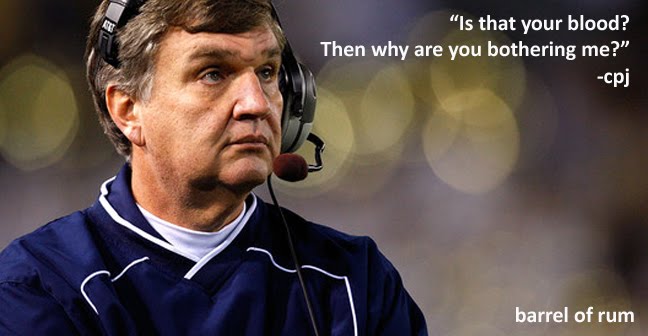There are times when events drive this website, such as during the season. Sometimes it's all we can do to run reviews and previews of each game. At other times the website drives content. It doesn't matter if nothing is happening, we have to find a way to turn that into a blog post. A good maxim to remember while reading any media outlet is that the most important story of the day isn't necessarily important.
With that said, the last series of the UGA game has been bugging us. Its not a big deal. The sting of that loss was quickly eased by the Orange Bowl Balm applied a week later. Besides, Paul Johnson knows more about football than we do buildings and hash browns. Yet four pass plays in row just seemed like an odd series, but how odd was it? How far outside of Tech's comfort zone was that series? A little outside a team's comfort zone could be justified as a change of pace to keep the defense off balance, but going way outside a team's comfort zone could be a mistake. Sure it may be a surprise, but your players may have difficulty executing the sequence do unfamiliarity with the plays.
To answer that question we wanted to come up with a system for charting offensive series in terms of how run heavy or pass heavy they are. We figure if you can come up with a number, or better yet a chart, then you can make a reasonable judgment on whether a series was in a team's comfort zone or not. If it was not, then perhaps something went wrong. Perhaps a penalty or time left on the clock caused a coach to stray from his typical strategy? If the difference persists over an entire game, perhaps the defense is effectively limiting the offenses options.
We began by breaking down every drive Georgia Tech ran this year into first down segments. How many plays, not including penalties, did it take to get a first down or end the drive? We then categorized the segments according to run/pass mix. We arranged the plays into groups from the most run heavy, four runs in a row (RRRR), to the most pass heavy, four passes in a row(PPPP), and assigned each group a numerical value.
We came up with a total of 30 sequences of four plays or less that could result in a first down or touchdown. Run heavy play sequences were numbered -15 to -1 and pass heavy pass sequences were numbered 1 to 15. The closer to -15 or 15 the more unbalanced the play sequence. The closer to 0 the more balanced the play sequence. We then calculated the team's average.
As a way of testing the system we compared Tech's game against Jacksonville State to Texas Tech's game against the North Dakota Fighting Sioux played that same weekend. Tech's average sequence came in -6.53, very run heavy. Texas Tech averaged a 6.10, almost completely opposite of Georgia Tech. So the system seems to work alright.
Below is how Tech rated on the season
RUN/PASS AVERAGE PER GAME = -8.11
PERCENTAGE OF SEQUENCES THAT RESULTED IN A FIRST DOWN OR TOUCHDOWN = 80.33%
Break Down
Value-Sequence-Total-Successful
-15 RRRR-14-10
-14 RRR-92-74
-13 RRRP-3-2
-12 RR-77-71
-11 RRPR-1-1
-10 RRP-33-16
-9 RRPP-2-1
-8 R-51-49
-7 RPRR-1-0
-6 RPR-9-4
-5 RPRP-0-0
-4 RP-12-12
-3 RPPR-0-0
-2 RPP-5-1
-1 RPPP-1-0
1 PRRR-4-4
2 PRR-4-4
3 PRRP-0-0
4 PR-7-7
5 PRPR-1-1
6 PRP-9-5
7 PRPP-0-0
8 P-23-21
9 PPRR-0-0
10 PPR-2-1
11 PPRP-2-1
12 PP-4-4
13 PPPR-0-0
14 PPP-3-1
15 PPPP-1-0
So on the season Georgia Tech only passed the ball on first and second down twelve of 347 sequences. Of those twelve times they were successful seven times. That's a good rate, but 22 points below their overall average. Further more, Tech only passed the ball on first, second, and third down four times, and was successful only once. Finally Tech only passed the ball on first, second, third, and fourth down once. We all know how that turned out.
We're not trying to make a big deal about this. Couch Johnson made a mistake all coaches have made. He missed on a big play he knew was there and kept going back to it. Each time digging himself deeper into a hole. For a brief second he lost track of what his team did well. It was a little mistake at a bad time.
Anyway, food for thought we hope.
Monday, December 21, 2009
Subscribe to:
Post Comments (Atom)


Totally not on topic...
ReplyDeleteMethinks Karma is about to bitch slap Alabama...